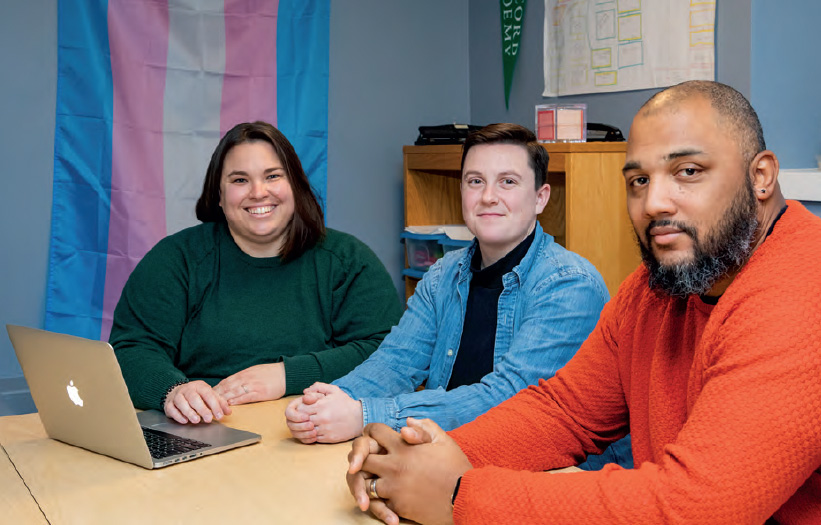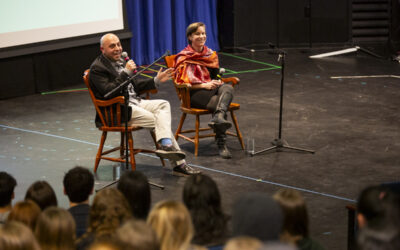
Pictured left to right: Courtney Fields-Thomas, Alex Holmes, and Grant Hightower all support the work of CA’s Gender Equity Task Force.
CA models systemic change in supporting students of all genders
“We see, hear, and value every student,” says Head of School Henry Fairfax. “That’s one of CA’s superpowers.” Now this promise extends explicitly to transgender and nonbinary youth in policy, as it has in practice. In CA’s recently revised community handbook, a new section on gender inclusion details the rights of gender-expansive students and their options for support.
CA’s approach to affirming students of all genders is grounded in the knowledge that this community has always been gender-diverse, whether it appeared so or not. Indeed, CA has an advantage over many institutions that are now initiating gender-expansive support: Concord Academy was established to advance gender equity.
Unlike schools that were originally for boys and later went coed, CA was founded to give girls an excellent education within a unique culture. Throughout its 100 years, CA has prized both individuality and community, and that balance informs an ongoing commitment to gender equity. Today, reflecting an understanding of gender as a spectrum, the school requires that all members of the CA community treat individuals’ expression of gender identity with respect and dignity.
Many schools are now seeking practical guidance for changing systems that were created on the assumption of a gender binary. In a sustained, coordinated effort, CA has been examining and shifting its institutional culture and structures to more equitably serve individuals who identify outside of that binary. Now the school is in the powerful position of learning in public, leading with vulnerability in sharing its challenges and successes. Fairfax says, “We don’t have all the answers, but we understand our growing edge and where we are in our process.”
In November, Director of Community and Equity Alex Holmes and Dean of Students Grant Hightower gave a presentation to independent school leaders at a national conference. They shared how CA is celebrating its gender-diverse students and changing its policies and procedures, physical campus, and approaches to professional development. Fairfax calls Holmes and Hightower “empathetic leaders, magnificent listeners, and clear communicators” who thoroughly understand the systems thinking necessary to reevaluate school structures: “Not just talking about it, but finding ways to execute.
This work is vital to students’ mental health and academic success. According to the 2019 GLSEN National School Climate Survey, when compared with cisgender peers, transgender teens typically experience less of a sense of belonging, lower GPAs, and higher likelihoods of generalized anxiety and major depressive disorders, as well as suicidal thoughts.
Holmes says a supportive school can make an enormous difference: “People exist in so many different ways. Our approach is rooted in basic kindness and respect for people’s autonomy, for their bodies and themselves.” That kindness is woven into CA’s culture, he says, but now it’s also “a specific commitment we can reference.”
Prior to working at CA, Holmes initiated a gender-support framework at a small school in Maine. In contrast, in Concord, he stepped into a working group of nearly 20 faculty and staff from across the school. He credits his colleagues for laying a strong foundation over the better part of a decade. Led by Community and Equity (C&E) team member Courtney Fields-Thomas, CA formalized a Gender Equity Task Force (GETF) in 2016 that has evaluated school procedures, infrastructure, electronic records, and protocols for student life, athletics, and the Health Center. Consulting with focus groups, external advisors, and other schools, the task force develops evolving best practices for teachers and administrators.
Gender touches nearly every aspect of school life, whether a student is living on campus, playing a sport, or seeing a nurse. CA students have the right to use the school’s many all-gender bathrooms, or the restroom and locker room that correlate with their gender identity. Students may compete on athletic teams that align with their gender identity and live in either historically male or historically female boarding houses (aligning either with their gender identity or their sex assigned at birth) or opt for a gender expansive house floor. Students also have the right to dress, express themselves, and be treated in accordance with their gender identity, and to be referred to with the names and pronouns of their choice. They also have the right to privacy: It’s up to them how they disclose their gender identity.
In practical terms, some support measures, such as changing student names in school systems, have required administrative flexibility. CA’s email system now assigns students unique numbered addresses so that names that appear in inboxes can be quickly and easily changed upon request. Approaching habitual processes with a fresh perspective has led to other modifications. For instance, teachers and advisors now write academic comments to students directly, in the second person, thus requiring no pronouns.
Enshrining respect for gender-diverse students’ agency in school policy makes it easier for faculty and staff to focus on them individually. “I’m excited I’m able to do intersectional work here,” Holmes says, noting the ability to address the interconnected nature of gender and other social categories, such as race and class, while supporting students.
“I have interacted with so many kids, genderqueer and not, who are grappling with something in their identities, and some who can’t otherwise explore it in a space that feels like home,” he adds. “More than anything, I want to make sure our decisions are centering the voices of students.”
Last year, the GETF convened a student focus group. While CA has active spaces for gender-diverse students—including the Gender Sexuality Alliance (GSA) and Trans Affinity Group (TAG)—most transgender and nonbinary students aren’t sitting together at the same lunch table every day. At CA, they’re more likely to spend time with friends with shared interests. So the focus group has also become a space for gender-diverse students, who might not otherwise talk much about their gender identities, to experience camaraderie.
One of the biggest challenges students in the focus group brought to light was the time they were spending waiting to get into the all-gender bathrooms, which can exceed the time scheduled between classes or before athletics. “We knew it was a problem,” Holmes says, “but we didn’t fully understand the repercussions. Now we’ve completed a major project to increase capacity in bathrooms this year.”
Another assumption Holmes questioned, after talking with students, was that the GETF should focus primarily on educating adults and changing systems. “Students were wanting to help their peers be the community members they hope they’ll be,” Holmes says. This year, the school adjusted orientation to offer more norm-establishing programming.
The C&E Office is also using a new gender support plan to guide conversations with students who are undergoing social or medical gender transition. It’s a way for students to easily share whether they’d like to change names or pronouns or connect with school services. The plan helps students navigate CA’s structures and also gives the school guidance on how best to affirm, protect, and support each person.
“Processes can often sound overwhelming and time-consuming to students,” Holmes says. “We really wanted something comprehensive, succinct, and individualized.” Reactions from students who have completed gender support plans this year have been very positive.
Holmes says CA colleagues are “eager to learn and meet the real need,” but that he still hears from many about their fears of missteps. “People say, ‘I really want to do it right, and I’m afraid I’m going to mess it up,’” he says.
Holmes tells them that trying to get the language right is important and that mistakes are moments for reflection and growth: “Over and over I hear from trans students their appreciation for our commitment to seeing and honoring them for the people they actually are.”
While understanding of gender is still evolving, Concord Academy has always respected its students’ minds and capabilities. This was notable, particularly in Concord’s early days when girls at most schools were routinely “finished” socially rather than challenged intellectually. Today, there’s still no notion of students leaving CA with “finished” identities but rather a commitment to starting them on their own authentic paths. In an institution not built to serve individuals outside of the gender binary, CA doesn’t consider the measures it’s taking to support gender-diverse individuals as extra: They’re allowing all students to have a similar experience.
“Transgender, nonbinary, and genderqueer students are thriving here at CA,” Holmes says. “They’re adding so much to the life and culture of the school.”
Story by Heidi Koelz
Illustration by David Espinosa for IPPF X Fine ACTS
Gender Equity Terminology
Cisgender: Having a gender identity that aligns with the sex assigned at birth.
Gender binary: The idea that only two distinct genders (male and female) exist.
Gender-diverse, gender-expansive, genderqueer: Terms to describe gender identities that do not conform to the gender binary.
Gender equity: Fair treatment of all people, regardless of their gender and recognizing their different needs and societal power.
Gender identity:
A person’s internal, deeply held sense of their gender.
Nonbinary: Experiencing gender identity and/or gender expression that falls outside the categories of male and female.
Sex assigned at birth:
The anatomical categorization of an individual at the time of their birth; this does not always correlate with gender identity.
Sexual orientation:
A person’s identity in relation to the gender or genders to which they are romantically or sexually attracted, as distinct from gender identity.
Transgender, trans:
Having a gender identity that differs from the sex assigned at birth.


